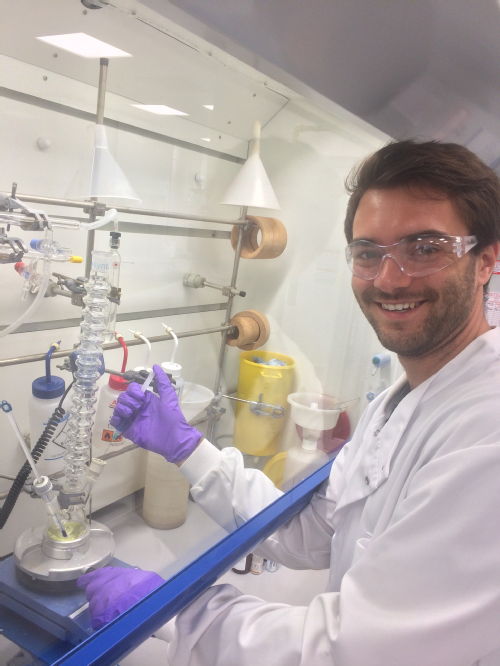Warwick Chemist tackling Tuberculosis awarded Industrial Fellowship
The Royal Commission for the Exhibition of 1851 has awarded Industrial Fellowships worth up to £80,000 to the UK’s 14 most promising young doctoral engineers and scientists – including one from the University of Warwick.
Timur Avkiran, a postgraduate researcher in the Department of Chemistry, becomes a 2017 Industrial Fellow, and will design and synthesise small molecule drugs for improving Tuberculosis treatment.
If the project is successful, the new drug will be combined with current Tuberculosis treatments to enhance efficacy, reduce antibiotic resistance, and cut down duration and relapse rates.
It will be the first of its kind to target the protein MptpB, secreted by the Tuberculosis pathogen, which suppresses the immune response and helps the bacteria to survive.
By removing MptpB, the Tuberculosis pathogen will be more vulnerable to antibiotics that are used to treat the infection.
According to the World Health Organisation, Tuberculosis is the second leading cause of death worldwide, accounting for 1.8 million deaths in 2015. Current treatments are complex, involving multiple antibiotics that must be taken in combination daily over many months, often under the supervision of a carer or medical personnel.
As well as carrying out research in Warwick’s Department of Chemistry, Timur works with LifeArc, a medical research charity that helps scientists and organisations turn their research into treatments and diagnostics for patients.
Timur Avkiran commented:
"I'm absolutely delighted. The Royal Commission 1851 have given me the opportunity to work with the Univesity of Warwick and LifeArc to try and tackle one of the biggest causes of mortality worldwide."
The Commission has supported Industrial Fellows to help bring their technologies to commercialisation and make an impact on businesses and society. Originally set up by Prince Albert following the Great Exhibition of 1851, the Industrial Fellowships recognise the best research that could advance British industry and award them funds to bring them to market.
Bernard Taylor, Chairman of the Royal Commission for the Exhibition of 1851, said: “Ensuring Britain’s young scientists and engineers are supported is crucial to ensuring that the UK is at the forefront of innovation in the years to come. Our Industrial Fellowships are designed to fund and commercialise the most promising technologies that could shape our society in the future. This year, we have awarded more Fellowships than ever before, and the breadth of technologies we are supporting, from artificial intelligence, to clean power and potential cures for most deadly diseases demonstrates that the talent in the UK is only growing.”
The Industrial Fellowships provide graduates with the means to develop innovative technology with commercial potential, ideally leading to a patent, while completing a PhD or EngD. Each Fellow receives up to £80,000 worth of funding over three years for their work, which they will carry out in collaboration with an academic institution and a business partner. The programme plays a crucial role in facilitating collaboration between universities and industry, offering much sought after funding for research and development for new intellectual property. It also enables promising scientists and engineers to conduct research whilst gaining valuable industry experience.
Image: Timur Avkiran
5 October 2017
Further information contact:
Luke Walton, International Press Manager
+44 (0) 7824 540 863
+44 (0) 2476 150 868
L dot Walton dot 1 at warwick dot ac dot uk

